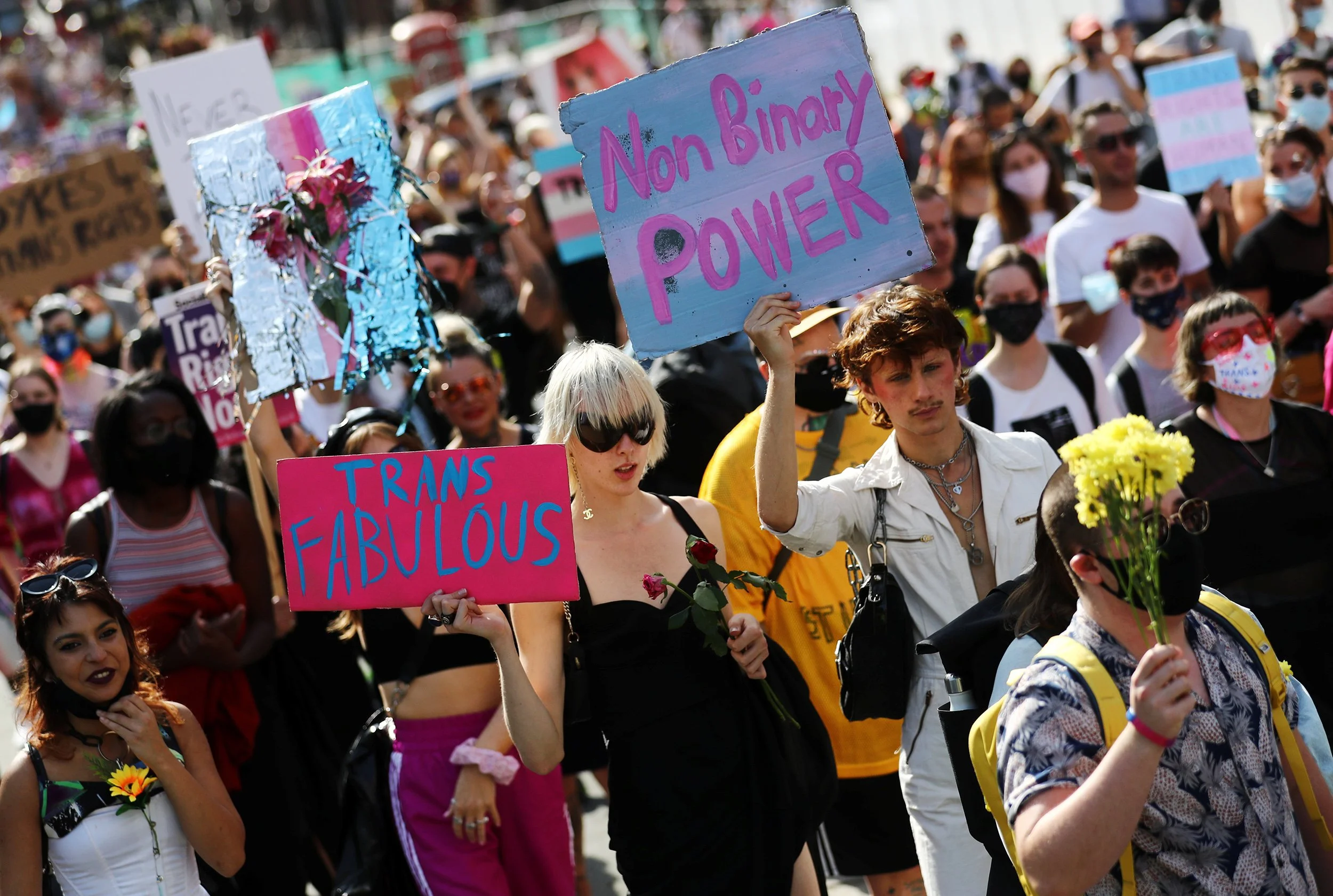OPINION: J.K. Rowling is, in fact, worth your outrage
“Protesters at the Trans Pride in London on Sept. 12, 2020.” Photo by Simon Dawson, Reuters.
Cara Finnegan is a sophomore studying sociology and pre-law, and an opinion writer for The New Political.
Please note that these views and opinions do not reflect those of The New Political.
Danny Murnin, another opinion writer at The New Political, has taken the stance that J.K. Rowling is not worth public outrage in his recent opinion piece. However, I believe that Rowling's rhetoric is worth the criticisms she faces, due to its incredibly harmful nature and her immense success and presence in the public sphere.
Rowling's fame and success as an author are undeniable. After all, she wrote “Harry Potter,” the best-selling book series in history. But what implications do her incredibly outward views on transgender rights have, given her stardom?
Murnin argues that activists in the U.S. should be more concerned with changing legislation in the U.S. than with Rowling's anti-trans media presence. While I agree that addressing large-scale legislative issues is a vital aspect of social activism, it is evident that Rowling's statements have been impactful beyond the internet and should be scrutinized. Senator James Lankford, R-Okla., directly quoted Rowling as he voted against the Equality Act, an LGBTQ+ civil rights bill. The bill will need 60 votes before it can pass the Senate and reach President Joe Biden's desk, where he has committed to signing it into law.
The Equality Act is vital for the fair treatment of LGBTQ+ individuals in the U.S. It aims to extend federal anti-discrimination protections to all, but especially LGBTQ+ Americans in the 28 states which have yet to enact state-level anti-discrimination policies. It will expand federal protection against discrimination on the basis of sexual orientation and gender identity and amend the Civil Rights Act of 1964 to include sexual orientation and gender identity as protected classes in housing, employment, education and federal programming.
Not only have Rowling's prejudiced views been used to enact the "terrible bills" that Murnin expresses disdain toward in his piece, but they have been used to delegitimize social movements of acceptance of transgender and nonbinary folks. According to the GLAAD's Accountability Project, Rowling tweeted, "Apparently, under a Labour government, today will become We Who Must Not Be Named Day," to bash transgender inclusivity on International Women's Day. This holiday celebrates all women, not just cisgender ones.
Similarly, Rowling posted a tweet that mocked the inclusive phrase "people who menstruate" when it was used in an opinion piece discussing menstrual health disparities. This language exists to include transgender men and nonbinary people in conversations about reproductive and menstrual health. Rowling’s rhetoric shows a prejudice that goes beyond the transgender community and extends into the realm of nonbinary and gender-nonconforming identities. Luvina Cooley makes an excellent point in her letter to the editor about the implications of Rowling's blatant misgendering of transgender folks and how hate speech spreads.
Cooley's is correct in stating that words are incredibly powerful. Not only has Rowling's social media presence been incredibly hateful, but her manifesto has incited large-scale impacts on policy and invalidated the lived experiences of gender non-conforming and transgender people.
Rowling's status as a well-known young adult fiction writer puts her into direct contact with younger, more impressionable readers and fans who may not understand the implications of her rhetoric and how incredibly harmful it is, both inside and outside of the United Kingdom. Her social influence could have dangerous ramifications, both for LGBTQ+ youth and impressionable adolescents.
Rowling's supporters should look in the mirror and realize that not everyone understands the lived experiences of transgender and nonbinary people. As a cisgender woman, my identity has never been erased by an award-winning writer. I will never experience coming out as trans or live through transitioning. That's OK; I don't have to have the same lived experiences as someone else to acknowledge their marginalization.
Despite the nostalgia of “Harry Potter,” it is evident that Rowling's media presence has made an incredibly detrimental impact on the lives of transgender and gender non-conforming folks, and is in fact, worth your outrage.

